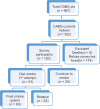Smoking behavior after coronary artery bypass surgery: Quit, relapse, continuing
- PMID: 33938833
- PMCID: PMC8081144
- DOI: 10.4103/aca.ACA_63_19
Smoking behavior after coronary artery bypass surgery: Quit, relapse, continuing
Abstract
Objective: Tobacco smoking represents a major risk factor for coronary artery disease. Our study aimed to investigate whether Coronary Artery Bypass Graft (CABG) surgery could act as a motivating factor to enforce smoking cessation. Specifically, we observed the success rate in individuals who quitted smoking, along with the number and reasons of relapse(s) at least one year after the operation.
Methods: The pre-operative characteristics, pre-operative tobacco exposure, socioeconomic factors and perioperative complications in patients who underwent isolated Coronary Artery Bypass Graft surgery in our Department from June 2012 to September 2016 were reviewed. Our survey was conducted via phone interview and using a standardized questionnaire. Only patients who were current smokers at the time of surgery were interviewed.
Results: Our study group consisted of a total of 120 patients, 91 (75.8') reported initially quitting tobacco smoking. Because of relapse(s), one year after the procedure the number of patients who were still non-smokers dropped to 69 (57.5'). Smoking cessation attempts were not supported by professional assistance.
Conclusions: Our findings demonstrate that there is a desire from CABG patients to quit smoking, as indicated by the high percentage of initial attempts in early postoperative period. However, a year after the procedure, only 57.5' of CABG patients were able to achieve or maintain smoking cessation. Patients who were retired or who were unemployed at the time of the surgery, found it easier to stop smoking than patients who were active employees. Patients who lived alone at the time of surgery also found it harder to stop smoking. Finally, patients with COPD also found quitting smoking harder in the post-operative period.
Keywords: Chronic obstructive pulmonary disease; coronary artery bypass; current smoking; smoking cessation.
Conflict of interest statement
There are no conflicts of interest.
References
-
- World Health Organization [Internet] Global Health Risks: Mortality and burden of disease attributable to selected major risks. [c2009-[cited 2012 Jun 16]]. Available from: http://www.who.int/iris/handle/10665/44203 .
-
- Messner B, Bernhard D. Smoking and cardiovascular disease.Mechanisms of endothelial dysfunction and early atherogenesis. Arterioscler Thromb Vasc Biol. 2014;34:509–15. - PubMed
-
- Al-Sarraf N, Thalib L, Hughes A, Tolan M, Young V, McGovern E. Effect of smoking on short-term outcome of patients undergoing coronary artery bypass surgery. Ann Thorac Surg. 2008;86:517–23. - PubMed
-
- Jones R, Nyawo B, Jamieson S, Clark S. Current smoking predicts increased operative mortality and morbidity after cardiac surgery in the elderly. Interact Cardiovasc Thorac Surg. 2011;12:449–53. - PubMed
-
- Gjeilo KH, Stenseth R, Klepstad P, Lydersen S, Wahba A. Patterns of smoking behaviour in patients following cardiac surgery.A prospective study. Scand Cardiovasc J. 2010;44:295–300. - PubMed
MeSH terms
LinkOut - more resources
Full Text Sources
Other Literature Sources
Medical

